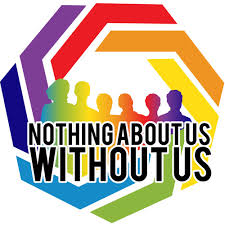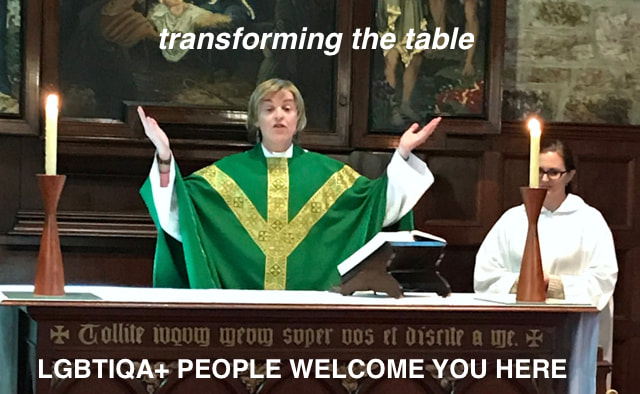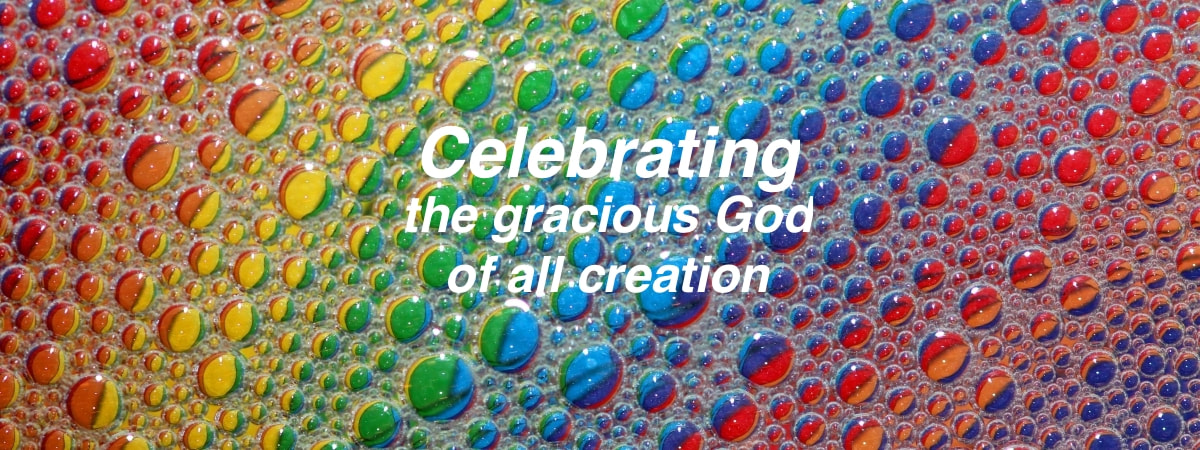|
I've been troubled lately by 'inclusive' churches saying 'LGBTIQA+ are welcome here'. Such words involve good intentions but embody the problem they seek to address. For let's think about it. Do we say 'heterosexual/cisgender people are welcome here'? Or, even when we aim to tackle enduring sexism and racism, do we say 'women are welcome here', or 'black people are welcome here'? Now thankfully this is a step beyond 'all welcome here' - that now trite phrase on so many noticeboards and church communications. Like the offensive phrase All Lives Matter, 'all welcome' tends not only to erase our vibrant differences, but pays no attention to our particular experiences of power and (degrees of) acceptance. 'LGBTIQA+ are welcome here' is also better than 'we welcome LGBTIQA+ people here', which much more starkly represents the issue: differentiating 'we' - i.e those at the heart of the church community - from 'them', the sexually and gender diverse 'outsiders'. Yet it too also reflects the dominant approach of relating to sexually and gender diverse people as 'Other'. It fails to speak of the agency of LGBTIQA+ people our/themselves. It still keeps us/them in the status of guests, more or less unwelcome. It does not grasp that sexually and gender diverse people are as much the hosts and gifts of God's love as anyone else. Perhaps it is even time to leave 'affirmation' behind, and speak more directly of celebration and transformation? After all, sexually and gender diverse people are as much hosts as guests in Jesus' 'radical hospitality'...  LGBTIQA+ people - hosts as well as guests of divine love When, for example, I preside at the eucharist, it is I, a gender and sexually diverse person, who is sharing in offering, not simply receiving, Christ's true welcome. For we are all called not just to have 'a place at the table'. That may be better than crawling around looking for crumbs off the table, but it not enough. Rather, through divine grace, we are called to be part of cooperating in the active transformation of the table, in faith communities and the wider world. Sadly, perhaps unconsciously, the phrase 'LGBTIQA+ are welcome here' can thus symbolise the way in which we restrict God's 'radical hospitality'. For power remains with the already privileged until we recognise that the 'outsiders', the Gospel 'little ones', are not only to be welcomed but that they are also the very locus of the liberation of us all. Seeing such signs therefore tends to make me wonder about putting up a different sign on our Milton Anglican church sites, turning things round and saying 'LGBTIQA+ people welcome you here'. That is a much more engaging invitation to LGBTIQA+ people anyway! After all, any group or community is always more attractive to a particular strand of humanity if that strand has actual visible agency there. For, as the earliest Christians did, we need to turn assigned human power expectations 'upside down' (Acts 17.6). That is the reality, extending beyond even welcome affirmation, of the ministry of radical Christ-like celebration in which we are invited to share... moving beyond 'affirmation', as well as 'welcome' and inclusion' Now I have to confess my own complicity in limiting God's radical hospitality by the terminology I have myself often used. As a whitefella ally, I am also aware of this in my relationships with Aboriginal and Torres Strait Islander people, who have taught me much about how this works for various 'outsiders' /God's 'little ones'. Over the last year or so for example, working with others in the Anglican Church Southern Queensland, I have sought to develop a Rainbow Faith project in our diocese. This is reflected in the positive Rainbow Faith website, curated by my excellent diocesan colleague Dr Stephen Harrison. This seeks to offer guidance to faith resources and spaces which not only support LGBTIQA+ people but reflect our/their own contributions and agency. For it is no coincidence that the particular Anglican churches we recommend are those which have demonstrated substantial commitments to LGBTIQA+ equity and vitality, as a result of having active LGBTIQA+ lay and/or clergy leaders. In conceptualising this initiative, I also deliberately sought to move beyond the language both of 'welcome' (which tends towards mere toleration), and 'inclusion' (which tends to overlook the particular needs and gifts of LGBTIQA+ people). Instead, I suggested 'safe, affirming and informed': 'safe' in order to avoid the 'russian roulette' so many sexually and gender diverse people experience in even 'welcoming' faith communities; 'affirming' as moving beyond 'inclusion' to active engagement; and 'informed' to develop more than well-meaning approaches. The more I reflect upon it however, 'safe, affirming and informed' tends mainly to provide a more solid basis for potential flourishing. What is also required is the leadership of LGBTIQA+ people our/themselves. Affirmation is not enough, even when it is celebratory (the real goal). For true Christ-like celebration of LGBTIQA+ people requires that the celebrants are not merely allies, however affirming. Rather LGBTIQA+ people must be celebratory agents of the transformation the Church so badly needs us/them to bring. This is the heart of the question facing faith communities today. Until certain allies and would-be celebratory affirmers understand this, and act upon it, they may actually be a significant part of the problem. 'Nothing about us without us' is not just an essential part of any truly flourishing approach to ending any group's oppression. It is also a crucial part of how 'good news' may be rediscovered and life-giving grace renewed within our faith communities. from objects to subjects of transformation The central challenge is therefore how increasing numbers of LGBTIQA+ people of faith may become agents of God's transformation. For, instead of being treated as objects of even 'affirming' theology, care and welcome, we/they need to become ever more visible and active subjects. From others this requires that we are truly treated as full members of the Body of Christ. Allies have been learning not to talk of us as 'broken', as particular examples of 'the Fall', 'intrinsically disordered', or 'disabled'. Yet many 'affirming' hetero-cisgender Christians too often still allow us to be victims of unconscious ecclesiastical 'social distancing'. Our gifts, voices and bodies are thus typically quarantined, or objects of interrogation, discussion and treatment. Instead of stepping back and allowing LGBTIQA+ people space, 'straight privilege' is rarely addressed. In addition however, as I acknowledge in my own life before I came out fully, sexually and gender diverse people of faith can also ocontribute to maintaining our oppression. Churches owe so much already to LGBTIQA+ people, even though so many of us/them are closeted or 'hidden in plain sight'. The cost of coming out fully is real, and fraught with genuine risk. Yet there will be no real progress, until and unless we sexually and gender diverse people of faith do emerge and claim our agency more boldly. transforming the table So, if not welcome, inclusion, or affirmation, what then? Increasingly I believe that transformative celebration is key. This is not only an invitation to allies to go deeper, to stop treating LGBTIQA+ people as 'other', and to get out of the way. It is also an encouragement to sexually and gender diverse people to share in fresh imagination and creativity. This involves us all, straight and queer alike, moving beyond simply providing, or seeking, 'a place at the table' for each other. Authentic welcome, inclusion and/or affirmation requires a much greater prayerful openness to God's 'new creation', more loving participation in Christ's work of redeeming all things, and an active sharing in the unfolding life of the Holy Spirit through our diverse gifts. beyond virtue signalling - some examples Examples of what transformative celebration look like can be found and emulated, in and beyond traditional churches. The Metropolitan Community Church (MCC) long ago created such space. In Australia we can look to denominational groups such as Acceptance and Uniting Network, and others such as the Brave Network and Equal Voices play their part. In particular locations, specific initiatives, such as the Integrity group at Holy Trinity Fortitude Valley, embody transformative celebration. With others, I am also involved in a new trans faith initiative Kaleidoscope People. Some examples are furthermore quite simple but deeply transformative - such as the rainbow and other LGBTIQA+ flags displayed prominently by St John's Anglican Cathedral in Brisbane. Significantly those Cathedral symbols do not simply say 'welcome' but are often, literally, put out by LGBTIQA+ welcomers. They witness not only to God's love for everyone, not least the oppressed, but to the agency and leadership of sexually and gender diverse people themselves in that particular faith community. St John's Cathedral, like some other Queensland church communities (such as St Mary's in Exile, Freshwater Anglicans, Merthyr Road and West End Uniting churches, and of course MCC Brisbane) have also actively opened up pulpits and other avenues for LGBTIQA+ people. For, as #BlackLIvesMatter and other movements remind us, it is not enough to have words, we also need deeds which move us all forward. Virtue signalling is too easy, cheap grace abounding. Much more meaningful are costly actions which enable genuine change and transformation. revising our Milton Anglican approach This is therefore not a plea for excessive political correctness, nor for excluding appropriate use of words such as welcome, inclusion and affirmation. It is however an invitation to deeper engagement, in prayerfulness, word and deed - and, for some, to a 'letting go' that others may breathe and thrive. In our MIlton Anglican community we are blessed with some wonderful sexually and gender diverse people who have great gifts and insights to share. Reflecting on these matters we are consequently revising the ways we are addressing and communicating radical hospitality. As our website now puts it, we seek to celebrate LGBTIQA+ people, and with them/us continue God's work of transforming love: Milton Anglicans seek to celebrate LGBTIQA+ people fully, providing a safe and joyful space for all, and rejoicing in the leadership of sexually & gender diverse people within our own community. We are active in Equal Voices initiatives and walking with LGBTIQA+ people for love and justice. Sadly, due to wider Church legal restrictions, we are unable to offer marriage ceremonies for all, but we do offer affirming prayers and other gatherings, including blessings for transgender people (eg for name changes & before surgeries) and baptisms for all. For we are all equally loved by God and infinitely valuable. The Revd Jo Inkpin, as a priest who is a transgender person, and the Revd Penny Jones, as her wife, are also available for particular support as required. (excerpt from https://www.miltonanglican.org/lgbtiqa-celebration.html)
1 Comment
|
AuthorJo Inkpin is an Anglican priest serving as Minister of Pitt St Uniting Church in Sydney, a trans woman, theologian & justice activist. These are some of my reflections on life, spirit, and the search for peace, justice & sustainable creation. Archives
July 2024
Categories
All
|


 RSS Feed
RSS Feed